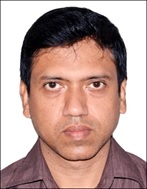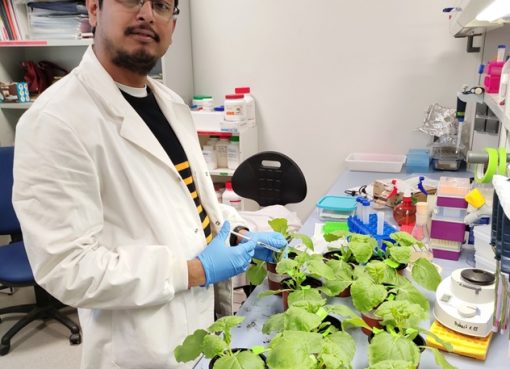Dr. Rajib Deb, currently working as a Senior Scientist at ICAR-National Research Center on Pig, Guwahati, Assam, India, joined Agriculture Research Service (ARS) as a Scientist in September 2011. He did his graduation (BVSc & AH) from College of Veterinary Sciences and Animal Husbandry, Selesih, Aizawal, Mizoram in the year 2005. He obtained MVSc and PhD in Animal Biotechnology in 2008 and 2014, respectively, from the Indian Veterinary Research Institute, Izatnagar, Uttar Pradesh.
With an emphasis on enhancing the livelihoods of Indian farmers, Dr. Deb has made substantial contributions to Indian livestock genomics and health science research. He uncovered important genetic markers related to thermotolerant traits found in Indian dairy cows that either directly or indirectly impact on milk production. His research revealed that the major stressor gene, hsp70, has a promoter variation at the AP2 box region that significantly affects the milk production traits of the Indian dairy cattle breed (Gene 15; 532:230-5); during thermal stress, the expression pattern of hsp90 varies between Indigenous and crossbred cattle, suggesting that Indian dairy animals, the “Desi cows”, are more thermotolerant than exotic or crossbred dairy animals in India (Gene 25; 536:435-40); identified novel microRNA signatures linked to thermo-tolerability in Indian dairy animals (3 Biotech, 11:79); discovered a novel IRES (internal ribosomal entry site) element at the bovine heat shock protein gene, an alternative thermoregulatory pathway during stress compromised situations (Molecular Biology Reports, 47: 7061–7071). He developed rapid loop mediated isothermal amplification assays for detecting dairy milk/meat adulteration, which can be visualized by naked eyes (Patent No. 474562, Molecular Biotechnology.58:850-860 & Patent No. 503089). He also developed a diagnostic kit named “CIRC-COWCAM Assay” for detecting adulteration of camel milk with cow milk and vice versa (The Patent Office Journal no. 35/2021 dated 27/08/2021. Page no. 38370, https://www.istem.gov.in/digitalcatalogue/ etgdashboard). In order to quickly detect food-borne pathogens in milk, he worked on developing two diagnostic assays: (a) a visual assay based on gold nanoparticles for the fast detection of Escherichia coli specific DNA in cow milk (LWT-Food Science and Technology, 155:112901), and (b) a lateral flow strip assay based on green nanoparticles for the on-site rapid detection of Staphylococcus aureus in cow milk (Journal of Food Science and Technology, 60: 132-146). He revealed the transcriptome fingerprints of significant pig viral pathogens (Gene, 836, p.146670). He investigated the possibility that the African swine fever virus could trigger upregulation of oncogenes in porcine host tissues after infection (Archives of Virology, 169: 54). Due to scarcity of vaccination against many critical livestock diseases, India’s livestock farmers incur large economic losses and consequently development of quick diagnostics against livestock diseases are very much needed. Dr. Deb has developed various diagnostic assays/kits against porcine diseases (Animal Biotechnology, 34:1883-1890; 3 Biotech, 12: p.325; Current Science, 126, January 2024; Journal of Food Science and Technology, 2024, pp.1-9). Few of the technologies have been transferred to Agriinovate India Limited, New Delhi for commercialization. Dr. Deb has also developed a chimeric DNA vaccine candidate against Infectious Bursal disease of Poultry (Research in Veterinary Science, 102, pp.7-14). He also contributed to developing diagnostics for detection of genetic disorders in cattle (Patent No. 411559; The Patent Office Journal no. 15/2018, dated 13/04/2018, Page No: 13461). It is also noteworthy that Dr. Deb is one of the team members engaged in developing “Frieswal”, a Synthetic cattle breed of India with the breed registration Accession number: INDIA_CATTLESYNTHETIC_2024_FRIESWAL_04001.
He has received several extramural research grants from DBT, DST, SERB, DAH&D, NAIP, World bank and ICAR. He has so far published 89 research papers in peer-reviewed SCI journals, 3 granted patents, 3 granted copyrights & filed 10 Indian Patents. So far, his research works have been cited 2646 times with an H-index of 27. He is the recipient of various national/International recognitions/awards, namely, TWAS Post-Doctoral Fellowship, Italy; ICMR-DHR International fellowship for Indian Young Biomedical Scientists; ICAR-National Post-doctoral Fellowship; INSA Visiting Scientist Fellowship; Fellowship awarded by Indian Society of Veterinary Immunology and Biotechnology, India; Associate fellowship awarded by different National Academies, namely, NAAS, NASI, INYAS, NAVS, NADSI and NABS; elected associate fellow of Royal Society of Biology, UK; NESA-Young Scientist award; Dr. V. S. Alwar Memorial NABS Best Scientist Award; SERB, DST Start up young scientist research grant award; Prof. S.B. Chincholkar Memorial Award by the Biotech Research Society of India (BRSI), India; ISVIB Mid-carrier Scientist Award by Indian Society of Veterinary Immunology and Biotechnology, India; International travel grants by SERB, DST, GOI; Best Book in agriculture Extension (First Prize) awarded by National Institute of Agricultural Extension Management (MANAGE), Hyderabad, India; Best Institutional Film – ICAR award in recognition of the outstanding contribution for the film on “Biosecurity in Scientific Pig Production” in the MANAGE Agri Film Festival 2023 etc.
Dr. Deb has guided 4 MVSc/MVPH scholars; 1 PhD so far. He is also an academic faculty of IVRI, Izatnagar. Currently, Dr. Deb is working on development of a virus-like particle-based vaccine candidate against porcine circovirus disease in pigs.




